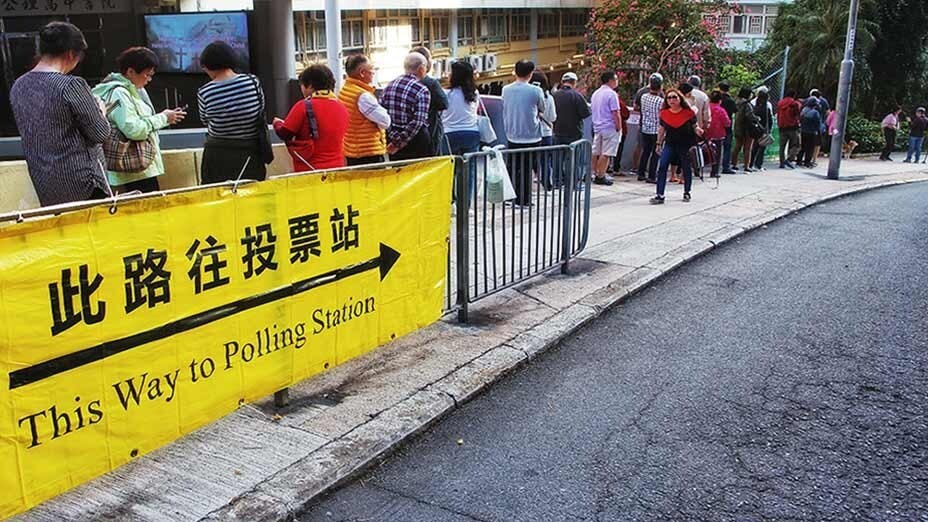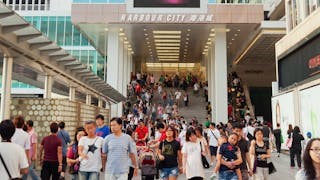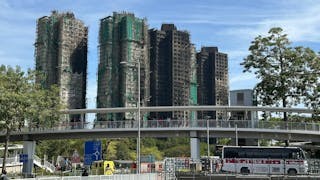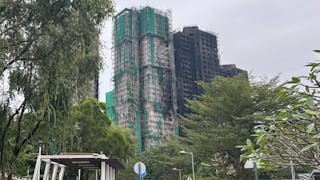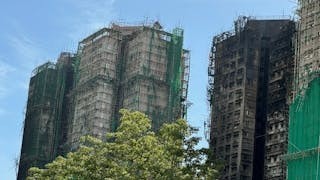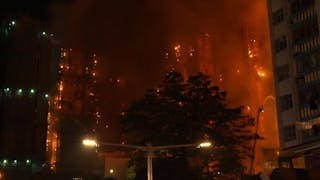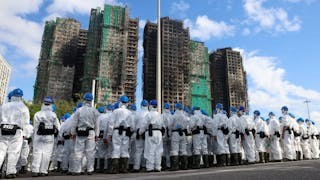11月24日香港舉行區議會選舉,是特區因為《逃犯條例》修訂引發的大型示威後首場主要選舉,被視為選民對特首林鄭月娥政府的一次考核,也是一直支持政府修例的建制派的一次挑戰。
今屆共有1090名候選人,競逐452個議席,比上屆2015年增加了21席,平均2.4人爭一個位,競爭最激烈。全部選區都要競逐,無人自動當選。
分析指出,《逃犯條例》修訂引發的政治風波令許多香港市民意識到必須利用選票,阻止香港的管治體制被一方壟斷,泛民主派雖然預料可以取得多些議席,但不一定能取代建制派成為區議會的大多數。
香港區議會是地方的行政機關,主要工作是就市政、地區交通等日常生活事務向政府提供意見,但立法會部分議席(立法會其中兩個功能組別都只能由區議員擔任,在70席的立法會中佔有6席)、以至負責選出特首的選舉委員會部份委員都會預留給區議員主席(2016年特首選舉委員會1200個成員當中,有117人由區議員互相提名、投票產生),因此這次選舉對明年的立法會選舉和2022年的特首選舉都會有影響。
這次區議會選舉一大亮點是沒有一名候選人可以自動當選,全香港所有選區都有最少兩人競逐當區區議員。
香港《明報》10月委託香港中文大學做的民意調查顯示,超過一半受訪者表示他們「完全不信任」香港警隊,表示完全信任的只有9.3%。鍾劍華認為,這都顯示市民覺得更需要制衡政府,這種想法「自然對泛民主派更有利」。
鍾劍華說他不會對泛民主派的選情過度樂觀,因為區議會選舉中與民生相關的地區議題仍然重要。
全港有超過610個投票站,投票時間為早上7時半至晚上10時半。全港有約413萬已登記選民,當中39萬為新登記選民。
今日市民投票相當擁躍,多區票站打蛇餅等投票。首小時逾15.7萬人投票,遠超上屆,破紀錄。
The District Council election held in Hong Kong today is the first major elections after the large-scale demonstrations triggered by the amendments to the Fugitive Offenders Ordinance. It is regarded as an assessment by the voters on the government of the Chief Executive Carrie Lam, and a challenge for the pro-establishment faction who supported the government’s amendments.
There are 1090 candidates in this year, competing for 452 seats, an increase of 21 seats from the previous year, with an average of 2.4 people competing for one seat, and the competition is the most intense. All constituencies must compete and no one is automatically elected.
Analysis showed out that the political turmoil caused by the extradition amendment has made many Hong Kong citizens aware of the need to use their ballot to prevent the governance system from being monopolised. Although the Pan-Democrats are expected to gain more seats, they may not be able to replace the pro-establishment faction to become the majority of the District Council.
The Hong Kong District Council is the local administrative organ. Its main job is to advise the Government on daily life matters such as municipal and district transportation. However, it affect some of the Legislative Council seats (the two functional constituencies of the Legislative Council can only be served by a District Councillor, accounting for 6 out of 70 legislators). Some members of the Election Committee, which is responsible for the selection of the Chief Executive, will be reserved for the District Council Chairman. Of the 1,200 members of the 2016 Chief Executive Election Committee, 117 are nominated and voted by the District Council members. Therefore, this election will have an impact on the next Legislative Council election and the 2022 Chief Executive election.
One key point of this District Council election is that no candidate is elected automatically. At least two candidates in all constituencies compete for all seats.
According to a poll conducted by the Chinese University of Hong Kong on behalf of Ming Pao daily news in October, more than half of the respondents said that they “completely distrust” the Hong Kong Police, and only 9.3% fully trust them. Professor Chung Kin-Was believes that this shows that the public feels that it is more necessary to check and balance the government. This kind of thinking “is naturally more beneficial to the pan-democrats.”
Chung said that he would not be overly optimistic about the pan-democratic elections, because regional issues related to people’s livelihood in district board elections are still important.
There are over 610 polling stations in Hong Kong. The voting time is from 7:30 am to 10:30 pm. There are about 4.13 million registered voters in Hong Kong, of which 390,000 are newly registered voters.
Today, the public voted quite enthusiastically with long queues at polling stations in many district. More than 157,000 people voted in the first hour, far exceeding the previous election, breaking records.



